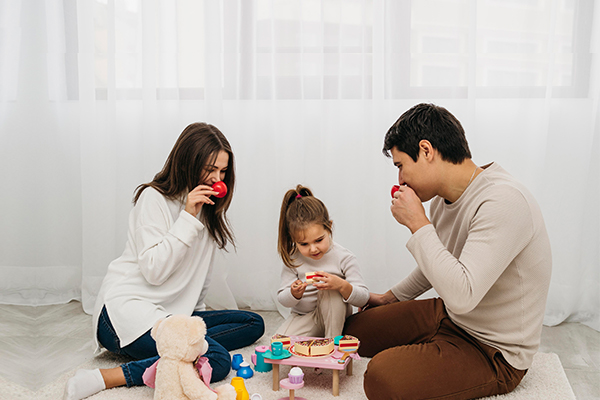
Six Positive Discipline Strategies For Every Parent
It occurs to all parents, even those of us who have had official child behaviour training. Our kid is charming and smiling one moment, then transforms into a wild Honey Badger the very next. Like every other kid on the planet, my kid occasionally engages in "spirited" or strong-willed behaviour. It's essential to remember that just because your child is having a bad day doesn't mean they're a bad kid or you're a bad parent. Parents can use the following positive discipline tactics.
There Are No Terrible Kids, Only Poor Behaviour
A logical consequence focuses on a child's behaviour rather than their character; as a result, it ranks first among positive discipline tactics for parents. Instead of scolding or criticizing the child, you're pointing out their bad behaviour. Consider this example: "You're so irresponsible," rather than "You're really irresponsible."
Consider the following: "What you did was completely irresponsible. I'm confident that you're capable of much more. We'll work out a design to help you solve the situation."
Illustrate To Them How To Behave
Action speaks louder than voice. Have you heard this before? This phrase is made for parent and child relationships. When you detect your youngster about to do something wrong or did something wrong instead of telling them what not to do, demonstrating your child how to behave appropriately will help them better. This is an effective method when it comes to positive discipline strategies for parents.
Introduce Time Outs
Time-outs are more like a break for your youngster to reflect on his actions (i.e. if he has misbehaved); hence an important point when looking for positive discipline strategies for parents. You must, however, remind him that time-out is not a punishment as a parent. Setting up a chair in an isolated location where your child may sit for a while and reflect on his activities and behaviour is the best approach to go about this. Leave him alone for no longer than five minutes at a time & remember to communicate it is not a punishment but its an opportunity to learn from their mistake.
Give Them Choices
This gives your child a sense of control and prevents him from feeling as if you are constantly instructing him what to do. For example, if your child has hit another person, you have two options. "Would you like to apologize for hitting or go into time-out until you calm down?" for example.
The Reward For Good Behaviour
Good behaviour should constantly be rewarded since it encourages your child to behave in the same way; hence this is one of the best positive discipline strategies for parents. However, bribing your child is not the same as rewarding your child. Bribery occurs when you try to motivate your child by promising a reward if he behaves appropriately. Bribing children trains them to be manipulative; if you keep bribing them, they will only do what you want if you reward them. So please stay away from that, but praise him when he does anything good.
Set Boundaries And Expectations
If your child enjoys playing, it is lovely, but you must establish clear guidelines for playtime, as it becomes necessary when implementing positive discipline strategies for parents. For example, after doing his homework, your child can play, or after finishing all of his vegetables, he can eat ice cream.
THREE Additional Positive Discipline Strategies for Every Parent
Turn Mistakes Into Lessons
If your child takes someone else's toy, you can utilize previous experiences to understand why he shouldn't do it. "Do you remember when your friend took the toy you were playing with?" you might ask. Didn't it make you feel terrible? It makes people feel the same way when you take something from them." Among all the other positive discipline strategies for parents, this one will help your youngster comprehend his playmates' emotions. He will grow into a kind and caring person as a result.
Don't Order
You can find new strategies to get your youngster to do what you want rather than ordering or telling him what to do. For example, if your kid has left his/her clothes on the bed/sofa without folding them, you can ask, "Where are we supposed to put our clothing?" instead of "Put your clothes in the wardrobe!"
Give Logical Consequences
The term "logical consequences" comes from Responsive Classroom, a research-based social curriculum used by educators worldwide to teach children collaboration, assertiveness, responsibility, empathy, and self-control (C.A.R.E.S.). Logical consequences are precisely what they sound like; they are repercussions that are directly tied to action rather than punishments.
For example, if you've created a clear expectation that your child understands, a penalty may be appropriate if they don't follow your instructions. Everyone makes errors, including children and adults, and penalties are essential for the learning process. If you offer your child instructions, they will follow them "We only color in the coloring books or on the paper you provide. We don't paint on the walls or on the furniture. "Taking the crayons away (until an agreed-upon time when they can try again to follow directions) and having them assist in cleaning up the crayon marks would be the likely repercussions if they didn't follow that direction and colored on the walls or table.
A consequence is not the same as a punishment. A consequence is frequently linked to an action, whereas punishment isn't. Many children develop armor and become impervious to punishment, mainly if it does not require them to take any action. Hence this is one of the most important positive discipline strategies for parents.
It's also crucial for the logical consequence to be something that is, well, logical. The goal is to teach people to take responsibility for their actions. Grandiose threats like "I'm giving away ALL your toys FOREVER!" aren't taken seriously by children. That's a slap on the wrist for both of you. Hope this little write-up helped you and wish you happy parenting.

Written by:
Swapna Seshadri
Leader - Customer Engagement Skoolz

Six Positive Discipline Strategies For Every Parent
It occurs to all parents, even those of us who have had official child behaviour training. Our kid is charming and smiling one moment, then transforms into a wild Honey Badger the very next. Like every other kid on the planet, my kid occasionally engages in "spirited" or strong-willed behaviour. It's essential to remember that just because your child is having a bad day doesn't mean they're a bad kid or you're a bad parent. Parents can use the following positive discipline tactics.
There Are No Terrible Kids, Only Poor Behaviour
A logical consequence focuses on a child's behaviour rather than their character; as a result, it ranks first among positive discipline tactics for parents. Instead of scolding or criticizing the child, you're pointing out their bad behaviour. Consider this example: "You're so irresponsible," rather than "You're really irresponsible."
Consider the following: "What you did was completely irresponsible. I'm confident that you're capable of much more. We'll work out a design to help you solve the situation."
Illustrate To Them How To Behave
Action speaks louder than voice. Have you heard this before? This phrase is made for parent and child relationships. When you detect your youngster about to do something wrong or did something wrong instead of telling them what not to do, demonstrating your child how to behave appropriately will help them better. This is an effective method when it comes to positive discipline strategies for parents.
Introduce Time Outs
Time-outs are more like a break for your youngster to reflect on his actions (i.e. if he has misbehaved); hence an important point when looking for positive discipline strategies for parents. You must, however, remind him that time-out is not a punishment as a parent. Setting up a chair in an isolated location where your child may sit for a while and reflect on his activities and behaviour is the best approach to go about this. Leave him alone for no longer than five minutes at a time & remember to communicate it is not a punishment but its an opportunity to learn from their mistake.
Give Them Choices
This gives your child a sense of control and prevents him from feeling as if you are constantly instructing him what to do. For example, if your child has hit another person, you have two options. "Would you like to apologize for hitting or go into time-out until you calm down?" for example.
The Reward For Good Behaviour
Good behaviour should constantly be rewarded since it encourages your child to behave in the same way; hence this is one of the best positive discipline strategies for parents. However, bribing your child is not the same as rewarding your child. Bribery occurs when you try to motivate your child by promising a reward if he behaves appropriately. Bribing children trains them to be manipulative; if you keep bribing them, they will only do what you want if you reward them. So please stay away from that, but praise him when he does anything good.
Set Boundaries And Expectations
If your child enjoys playing, it is lovely, but you must establish clear guidelines for playtime, as it becomes necessary when implementing positive discipline strategies for parents. For example, after doing his homework, your child can play, or after finishing all of his vegetables, he can eat ice cream.
THREE Additional Positive Discipline Strategies for Every Parent
Turn Mistakes Into Lessons
If your child takes someone else's toy, you can utilize previous experiences to understand why he shouldn't do it. "Do you remember when your friend took the toy you were playing with?" you might ask. Didn't it make you feel terrible? It makes people feel the same way when you take something from them." Among all the other positive discipline strategies for parents, this one will help your youngster comprehend his playmates' emotions. He will grow into a kind and caring person as a result.
Don't Order
You can find new strategies to get your youngster to do what you want rather than ordering or telling him what to do. For example, if your kid has left his/her clothes on the bed/sofa without folding them, you can ask, "Where are we supposed to put our clothing?" instead of "Put your clothes in the wardrobe!"
Give Logical Consequences
The term "logical consequences" comes from Responsive Classroom, a research-based social curriculum used by educators worldwide to teach children collaboration, assertiveness, responsibility, empathy, and self-control (C.A.R.E.S.). Logical consequences are precisely what they sound like; they are repercussions that are directly tied to action rather than punishments.
For example, if you've created a clear expectation that your child understands, a penalty may be appropriate if they don't follow your instructions. Everyone makes errors, including children and adults, and penalties are essential for the learning process. If you offer your child instructions, they will follow them "We only color in the coloring books or on the paper you provide. We don't paint on the walls or on the furniture. "Taking the crayons away (until an agreed-upon time when they can try again to follow directions) and having them assist in cleaning up the crayon marks would be the likely repercussions if they didn't follow that direction and colored on the walls or table.
A consequence is not the same as a punishment. A consequence is frequently linked to an action, whereas punishment isn't. Many children develop armor and become impervious to punishment, mainly if it does not require them to take any action. Hence this is one of the most important positive discipline strategies for parents.
It's also crucial for the logical consequence to be something that is, well, logical. The goal is to teach people to take responsibility for their actions. Grandiose threats like "I'm giving away ALL your toys FOREVER!" aren't taken seriously by children. That's a slap on the wrist for both of you. Hope this little write-up helped you and wish you happy parenting.

Written by:
Swapna Seshadri
Leader - Customer Engagement Skoolz

 +91 9742974283
+91 9742974283









